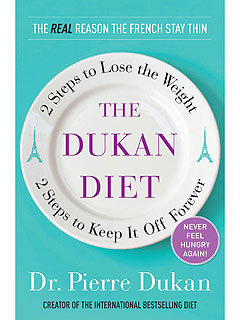 Everywhere I look these days I see something about the Dukan Diet. it’s the diet that, famously, Kate and her mother went on prior to the Royal Wedding. And it’s touted as the new French woman’s secret. Apparently it swept Europe after it was first published in 2000, and now it’s come to North America. I also read a claim that it was similar to Atkins but with a few key changes (like a “healthier Atkins”).
Everywhere I look these days I see something about the Dukan Diet. it’s the diet that, famously, Kate and her mother went on prior to the Royal Wedding. And it’s touted as the new French woman’s secret. Apparently it swept Europe after it was first published in 2000, and now it’s come to North America. I also read a claim that it was similar to Atkins but with a few key changes (like a “healthier Atkins”).
With all this attention, I decided I really had to look into it.
So I bought the book, read it completely, and here’s my summary:
Pierre Dukan is a French physician who developed his diet over 35 years in clinical practice.There are four phases to the diet.
1)The Attack Phase. This is where you eat what he calls “pure protein”. Only lean meat, poultry, fish, and eggs, nonfat dairy, and tofu. Plus 1 1/2 tbsp oat brain daily, at least 1 1/2 quarts water daily, and a 20 minute walk every day. The idea here is to kick-start your weight loss and give you some positive reinforcement. This phase lasts 2-7 days.
2)The Cruise Phase. Here you alternate 1 pure protein day with 1 protein + vegetables day (but not starchy eg, like potatoes, corn, and lentils). Plus oat bran (now 2 tbsp) and 30 minutes of walking daily. You stay on this diet until you’ve reached your target weight. Dukan reports that you should expect to lose around 2 pounds per week, although the weight loss may be faster in the initial stages of this phase.
3)The Consolidation Phase. He also calls this the Transition Diet. The idea here is a very slow transition back to your “normal” or long-term eating plan. He says that this is a crucial phase, and ignoring this step (on any diet) is the reason so many people have rebound weight gain. The duration of this phase is 5 days for every pound you lost on the diet. Essentially, you’re slowly re-introducing the foods you eliminated from the first two phases. So what are you eating? All protein and vegetables from the previous phase, plus one serving of fruit per day, 2 slices of whole grain bread per day, 1 1/2 ounces of cheese per day, and 2 servings of starchy food per week. Plus 2 “celebration meals” per week, and 1 day of pure protein per week.
4)The Permanent Stabilization Phase. This is the eating plan you are supposed to maintain for life. It’s pretty simple: you eat “normally” 6 out of 7 days per week. Each week you have one day of pure protein, just like in the Attack Diet. He has three other guidelines: 1)no escalators or elevators. 2) eat 3 tbsp of oat bran a day. And 3) “Hold on to everything you have learned and the good habits you have acquired while completing the whole program”.
So after reading the book, I looked for some evidence or research that might have been done on this particular diet. And there was nothing. Nobody has researched the Dukan diet, specifically. Not even Dukan himself. Okay, well, except from his observations while using this diet with his patients for 35 years. But this experience is all anecdotal and observational. Which isn’t terrible, just not exactly rigorous research. But just because there isn’t a lot of research on something, doesn’t necessarily mean it’s bad. It could just mean scientists haven’t had a chance to study it yet. The truth–good or bad, or both–will come out eventually. But that doesn’t help us in the here and now.
There is rigorous research, on the other hand, for the general principle of low-carb diets. They are effective for weight loss, that much we know. And that’s Dukan’s underlying principle: low (or no) carb, and high protein.
The most radical part of this diet is the Attack Phase, where he advocates protein only. And this is where dietitians seem to get a little nervous (or scream & shout). But, the thing is, that phase only lasts 2-7 days. That’s pretty brief. If you’re generally healthy, it’s hard to imagine you doing any major damage to yourself in such a short time. Especially if you follow his advice and drink tons of water. After that, the alternating protein diet, he’s got you eating plenty of vegetables, which is a very healthy thing. And he emphasizes lean protein–which, to my mind, is a good thing (better than a bacon-cheese-egg diet which is a common interpretation of Atkins, the Zone, etc). The third phase is where I have a few more concerns. In principle, I think a very slow transition phase to allow your body to stabilize after weight loss is a great idea. But the rules in this phase are complicated, and I wonder how many people will be able to follow it properly. Also, going for so long with so little fruit has me worried, too. The fourth phase, for long-term maintenance, seems to be pretty sound. Again, I don’t think most people would be harmed by a protein day once a week. I’m just not sure it would be enough to keep people from regaining weight over the long-term. A lot would depend on what they’re eating the other days of the week.
Bottom line for me: I think this diet might work for weight loss for some people. The rules of the weight loss phases are pretty simple, and keeping things simple is very helpful for adherence to a diet. I’m going out on a bit of a limb here, given that my profession is evidence-based, and this diet is anything but. It’s pretty radical to go so low-carb, and not something I would advocate long-term. Vegetarians would have a difficult time with this diet. And I would not recommend it for anyone who isn’t generally healthy, especially people with kidney disease, and certainly not for pregnant/breastfeeding women or children.
I guess what it comes down to is weighing the costs and the benefits. Do the benefits of weight loss to a person’s health, especially if they are obese (and thus at high risk of heart disease, cancer, diabetes…well-documented stuff), outweigh the possible (and as yet, not exactly known) risks of a radical diet in the short-term? If a diet like this helps someone who is destined for bad health consequences down the road, is it worth the short-term complications (like constipation and bad breath on a high-protein diet)? Lots of questions, not a lot of answers at this point (from a research point of view). But, as with so many things, I think it comes down to individual factors–what works for one person may be a terrible idea for another. And vice versa.
Anybody have any experience with the Dukan Diet? I’d love to hear about it.
|
Get the newsletter! If you enjoyed reading this post, why not sign up for Dr. Kim’s free newsletter? Get fresh health advice delivered directly to your email inbox (starting with Dr.Kim’s special report, Health Architecture: Blueprint for a Healthier Life). |






